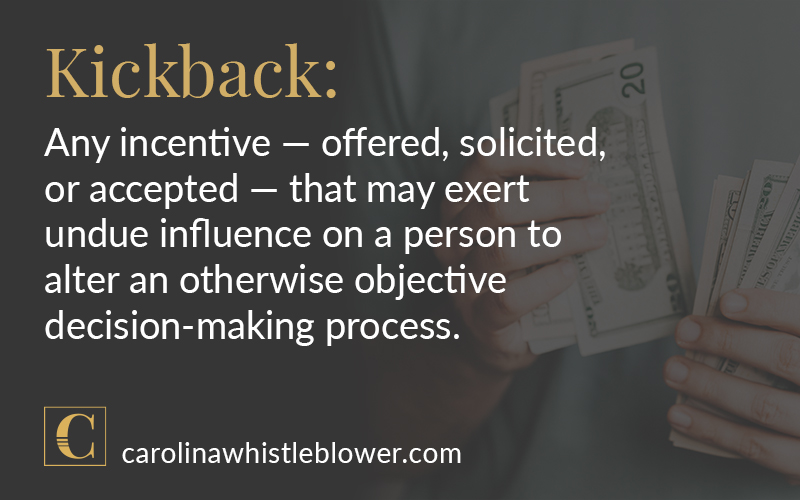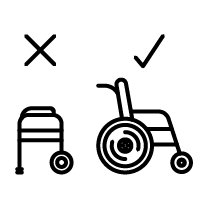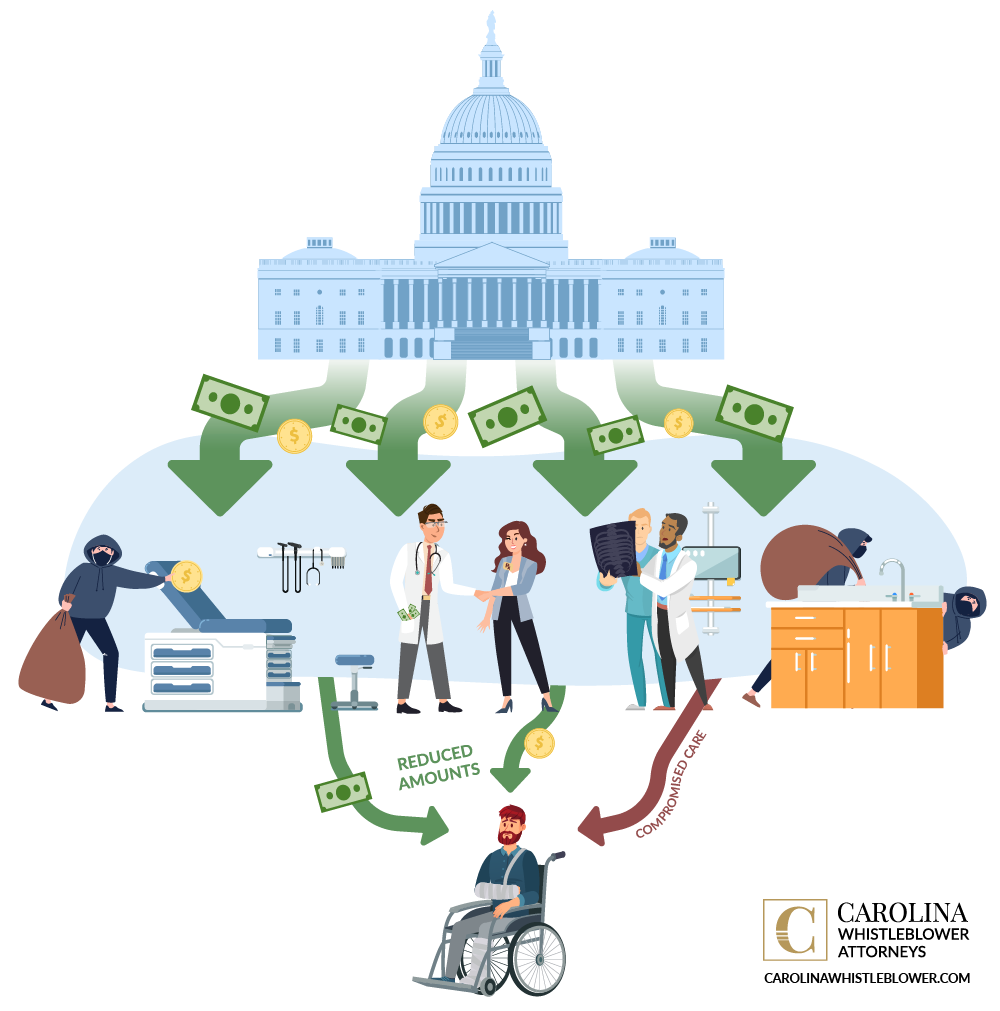Each year, the Department of Justice’s False Claims Act recoveries are mostly from fraud in the healthcare industry. It happens a lot, and it hurts us all – that’s taxpayer money, and it’s being taken in circumstances where it was meant to help patients. Billions and billions of dollars a year are lost to healthcare fraud.
What most people think when they think of a “kickback” may be far too simplistic. Kickbacks can be infuriatingly complex and convoluted schemes. To understand a healthcare kickback, I’ll start by explaining what a kickback really encompasses. I’ve encountered a few, both when I served as U.S. Attorney and in private practice.
Do you suspect someone is taking a kickback? Patient care should never be improperly influenced by financial incentives. Call us at 1-888-292-8852 for a free, confidential case review by a Carolina Whistleblower Attorney.
What is a kickback?

That’s an extremely broad definition. In the strictest legal sense, a kickback is anything that violates the federal Anti-Kickback Statute, also known as the Stark Law.
I don’t think either of those definitions is completely helpful, so let me give you another definition and some context.
Kickback: Any incentive – offered, solicited, or accepted – that may exert undue influence on a person to alter an otherwise objective decision-making process.

What do you mean by “incentive?”
The driving force behind kickbacks is simply greed. Incentives play to that greed, and they can range from a one-time bag of money to a long-term financial relationship between medical providers, insurers, manufacturers, and others. The forms of fraud have only grown more complex.
It’s important to realize that the incentive merely needs to be offered or solicited to trigger the law. In this case, just trying to break the law breaks the law.
In healthcare, anything that incentivizes behavior that is not in the best interest of the patient can be a kickback, such as:
Financial incentives, like bonuses, profit-sharing, or excessive compensation
- Below-market-pricing or free rent, whether for business or private use
- Free equipment
- Indirect benefits to a family member
- Gifts (from vacations to jewelry to a turkey on Thanksgiving)
The Stark Law prohibits anything that may cause undue influence on medical decisions. And the False Claims Act is a factor if there’s even a penny of government money involved.
What kinds of things do healthcare kickback schemes involve?
Kickback schemes can touch on any aspect of patient care. Healthcare providers have ample opportunities to improperly pad their bottom lines throughout the process. That’s because healthcare services are not uniform and mathematical – they involve judgment that creates a gray area. The Anti-Kickback Statute is broad for a reason.
Some common kickback schemes involve:
|
|
 |
|
|
Who can be involved in kickback schemes?
Medical kickbacks can involve any person or entity related to the healthcare industry, such as:
- Hospitals and hospital systems
- Pharmaceutical manufacturers and pharmacies
- Medical professionals
- Construction companies
- Medical equipment makers
- Repair and maintenance companies
- Health insurers
- And others
For example, let’s say a transportation company colludes with a healthcare provider to win the bid to provide transportation for patients to and from the provider’s facility. In return for winning the bid, the company provides part of the contracted amount back to the healthcare provider.
If any of the money for that contract comes from the federal government, as it would for a TRICARE, Medicare, or Medicaid patient, the fraud could trigger the False Claims Act as well as the Stark Law. The company hasn’t just cheated other providers of transport services out of a chance to win the business. They’ve prevented a fair bidding process designed to reduce the price for taxpayers.

Tip of the iceberg – Real cases of healthcare kickback fraud
Here’s one from the archives. When I was U.S. Attorney for the District of South Carolina, we brought a case against a healthcare provider for soliciting kickbacks from a drugmaker. The provider would allegedly swap Medicare beneficiaries to the drugmaker’s products and in return, the drugmaker would reward the provider with things like rebates, grants, speaker fees, consulting services, meals, and travel. The provider paid $4.19 million to settle the allegations.1,4
That case was straightforward compared to one we’re working now, which has proven to be a meeting of complicated fraud and complex law. But that’s a story for another time.
What should I do if I suspect healthcare kickback fraud against the government?
Federal healthcare programs are massive bureaucracies, but even they cannot possibly patrol all the medical professionals, medical services, patient referrals, individual Medicare and Medicaid patients, TRICARE patients, and so on. Having an anti-kickback law means nothing if you have no means of detecting the fraud and enforcing the law.
Contact a whistleblower attorney the moment you suspect fraud – even if you’re not quite sure. And if you are sure, even just one piece of evidence can be enough to file a case and begin investigating. Where there’s fire, there’s often more fire, so to speak. I can tell you if you may have a case in one discreet conversation.
Even recognizing healthcare fraud often requires someone who is familiar with the many disparate systems and laws in place, invoices, and the relationships between patients, procedures, providers, and federal healthcare programs. In other words, you may be the only person who understands what you’re seeing. If it feels fishy, speak with us.
Learn More: Whistleblower Dos and Don’ts
Whistleblowing: Justice can be rewarding

Bill Nettles
I’ve had many conversations with whistleblowers. They’re interested in justice, as well as any reward they may be entitled to. Some were embarrassed when they asked about a reward. I say, don’t be embarrassed!
If you’re seeing fraud that government healthcare programs and their stewards aren’t, it’s costing all taxpayers money. Finding, fighting, and stopping fraud – and potentially rewarding those who step up – is a good use of tax dollars.
Said another way, a whistleblower reward is a better way to spend tax dollars than letting someone unjustly line their pockets at the expense of patients. But that’s just one taxpayer’s opinion.
Together we can fight healthcare kickback fraud
In my experience, fear keeps a lot of potential whistleblowers from stepping forward. That’s why we created our You-First Policy. Not only do we work hard to help whistleblowers, we’re well-versed in fighting against retaliation tactics. We know the whistleblower process from beginning to end.
We’ve had a lot of success helping people expose healthcare fraud.1,4 We can set your mind at ease, give you our perspective, and help you decide on the best way forward for you. So, if you suspect or have evidence of healthcare kickbacks, call us today at 1-888-292-8852, or contact us securely online.
Similar Articles
Healthcare Fraud | February 20, 2025
2024 NC Medicaid Expansion Increases Fraud Risk
NC Medicaid Expansion Could Mean More Medicaid Fraud: Have You Spotted Any? The 2024 NC...
Healthcare Fraud | December 05, 2024
Carolina Whistleblower Attorneys Helps Brave Whistleblower Resolve Alleged Medicaid Scheme
As a whistleblower attorney and former U.S. Attorney, it’s always rewarding to be part of...
Healthcare Fraud | March 07, 2024
Medicare Catheter Fraud Could Cost the Public $2 Billion
On January 9, 2024, The Washington Post and The New York Times reported on a...
Contact the Carolina
Whistleblower Attorneys
If you’re wondering if it’s a good idea to speak with a whistleblower lawyer about what you know, let us set the record straight.
- Corporate ethics hotlines can be risky and may lead to termination. If you’ve already done this, call us immediately.
- Your coworkers could be aware of the fraud – or complicit in it – and you should not talk to them about it.
- The first claim to be filed under the False Claims Act can proceed – if you’re not first, you’re at a serious disadvantage and may get nothing (another reason not to speak to your coworkers about it).
- A confidential discussion costs you a few minutes, but could save you time, stress, and money.
"*" indicates required fields
